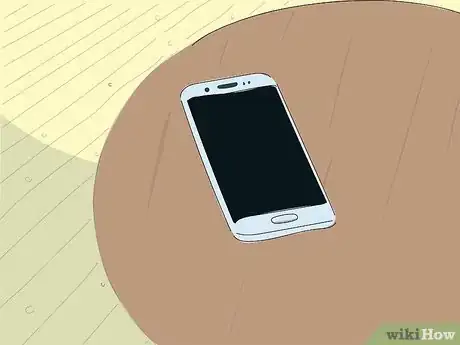This article was co-authored by Rebecca Tenzer, MAT, MA, LCSW, CCTP, CGCS, CCATP, CCFP. Rebecca Tenzer is the owner and head clinician at Astute Counseling Services, a private counseling practice in Chicago, Illinois. With over 18 years of clinical and educational experience in the field of mental health, Rebecca specializes in the treatment of depression, anxiety, panic, trauma, grief, interpersonal relationships using a combination of Cognitive Behavioral therapy, Psychodynamic therapy, and other evidence-based practices. Rebecca holds a Bachelor of Arts (BA) in Sociology and Anthropology from DePauw University, a Master in Teaching (MAT) from Dominican University, and a Master of Social Work (MSW) from the University of Chicago. Rebecca has served as a member of the AmeriCorps and is also a Professor of Psychology at the collegiate level. Rebecca is trained as a Cognitive Behavioral Therapist (CBT), a Certified Clinical Trauma Professional (CCTP), a Certified Grief Counseling Specialist (CGCS), a Clinical Anxiety Treatment Professional (CCATP), and a Certified Compassion Fatigue Professional (CCFP). Rebecca is also a member of the Cognitive Behavioral Therapy Society of America and The National Association of Social Workers.
There are 7 references cited in this article, which can be found at the bottom of the page.
wikiHow marks an article as reader-approved once it receives enough positive feedback. This article received 22 testimonials and 100% of readers who voted found it helpful, earning it our reader-approved status.
This article has been viewed 521,348 times.
Maybe you’re in a relationship with someone you don’t trust completely and you find that your thoughts often run wild. If they don’t pick up the phone, you might immediately think they're cheating or doing something sketchy. However, this kind of thinking can hurt you and your relationships and you’re probably eager to make a change. Overcome these thoughts by putting them to rest, balancing your mind, and creating a stronger relationship with your partner.
Steps
Putting the Thoughts to Rest
-
1Take several deep breaths. Once your thoughts start to run away from you, take a few deep breaths. The more you breathe, the calmer you’ll feel. Breathe in deeply through your nose and exhale slowly through your mouth for three seconds each until you feel settled.
-
2Find a quick fix to your worries. Often, the things you worry about might have several immediate solutions. Instead of letting your thoughts get carried away, do something to address them! You’ll feel better once you take action.
- For instance, if your partner isn’t responding to your texts, call them to see if everything is okay.
- If they still don’t answer, set a timer on your phone for one hour and do something else during that time. Take a hot bath, get in a nap, or watch a few episodes of your favorite show. You can call back when the timer goes off, but they’ll probably have already called you!
Advertisement -
3Counteract your negative thoughts with responses. When your thoughts begin to spiral, confront them head-on. Instead of allowing yourself to think of the worst-case scenario, consider the most realistic explanation instead.[1]
- For instance, if you haven’t heard from your significant other for hours, you might think they’re cheating. But, if you know they had a busy day at work, realize that they might’ve gone home to nap.
-
4Find something to make you laugh. Laughter truly is the best medicine. Sometimes you might overthink simply because you're in a bad mood. Improve your mood by finding some funny videos to watch online.[2]
-
5Distract yourself. Rather than freaking yourself out, do something fun or productive. Blast some music and have a mini dance party or call your mom to check in. You can also take a nice, hot shower or get some sunlight.[3]
- Distraction is okay to use temporarily, but you should ultimately address the underlying worry causing your thoughts and feelings. If these issues are not addressed, it can cause you and your partner to become irritated with each other and the lack of trust may continue to build as a result.
-
6Phone a friend who will talk you off the ledge. Talking to your friends may help you think more rationally. If you're freaking out, call one up to see if your worry is realistic. If not, let it go and find something else to do. Only phone friends who are wise and trustful and avoid calling fellow over thinkers.[4]
-
7Seek the help of a counselor if you think you have anxiety. If you find that your worries never go away or often worsen, you might be dealing with anxiety. It’s normal to have worries in relationships, but if you have a hard time overcoming them or if they are interfering with your happiness and productivity, it’s okay to get some help. Many counselors can help you work through your problems and create healthy relationships.
- If you’re in college, many universities offer free therapy. If you are employed, search on your insurance’s webpage for therapists who accept your insurance. You can also do a Google search of the term “therapists in” followed by your area code.
Having a Balanced Mind and Body
-
1Practice meditation daily. Meditation helps to quiet negative thoughts in your head and improve your focus. Each day, take at least ten minutes and sit in a quiet space where you will be uninterrupted and focus on nothing but your body and your breaths.[5]
- If you haven't ever meditated, use an app like Headspace or Calm.
-
2Put down your phone more often. Your overthinking might be triggered in part by an attachment to your phone. You might find yourself looking at it every minute for a call or text from your partner. Instead of obsessing over communicating with them, unplug sometimes.[6]
- Leave your phone at home occasionally when going out with friends. Put it on silent when working or watching your favorite show.
-
3Repeat positive mantras to yourself daily. Your overthinking might come from a self esteem issue. You may worry that you don’t measure up or that your partner deserves better. To combat these thoughts, repeat mantras to yourself in the mornings or when you feel down.[7]
- You might say “I am beautiful. I am intelligent. I am worthy of love.”
-
4Make time for yourself apart from your partner. You might want to spend all your free time with your partner just so you can keep an eye on them. Though spending time together is good, your relationship with yourself is critical. Take at least one day a week to do something that’s just for you. Remember that you’re not just a person in a relationship; you have a whole identity apart from that.[8]
- Spend time doing your favorite hobbies like reading, writing, running, or dancing.
- The more activities you do outside of your relationship, the less time you will have to overthink.
-
5Take care of yourself. It’s difficult to have a healthy mind if your physical health is in disarray. Try to get at least seven hours of sleep a night, exercise three times a week, and eat a healthy diet.
- Try to exercise for at least thirty minutes per day. Start off by jogging in your neighborhood. Later, join a gym and do some exercise classes. Yoga is another great option that can be done from home.
Forming a Stronger Relationship
-
1Think about what may be causing your concerns. Become aware of yourself and what your concerns are that are causing you to overthink in your relationship. You cannot address these concerns without first knowing what they are. Consider writing down your concerns whenever you catch yourself feeling worried or distrustful. Then reflect on what you’ve written down.
- For example, you may discover that your concerns are about not being good enough for your partner and feeling unworthy of them.
-
2Celebrate the good in your relationship. Even though you overthink, your relationship likely has some great qualities. Maybe your partner is very thoughtful or you two have a lot of fun together. Spend time doing things you both enjoy and let your partner know you appreciate them.
- Go to amusement parks, paint classes, or the movies.
- To show appreciation, say “Babe, thanks so much for always making sure I have a good dinner. I appreciate it.”
-
3Have a conversation about both of your needs.[9] Your overthinking might come from some unresolved issue in your relationship. Talk to your partner openly and honestly about what you need from them. Listen to their needs as well. Find ways to compromise with one another so you can both be happy.
- For instance, perhaps it bothers you when your partner doesn’t call after getting home from a night out. Ask if they can call or text you when they get home from now on.
- Find out what changes your partner would like you to make. Say, “I know I might be asking a lot of you, but I’m willing to make some changes, too. What would you like from me?” He might ask for a bit of space from you, and that’s okay! Give it to him and allow him time to miss you.
- Keep in mind that the point of a relationship is to share and experience each other's company, not to fix your own personal problems. Only you can do that for yourself.
-
4Have regular relationship check-ins.[10] Set aside time each week to check in with each other and discuss how you're both feeling about the relationship. Allowing yourself to make time for your relationship and practice communication can really improve your overall interpersonal relationships and alleviate the need to overthink things. You might ask each other questions like:[11]
- "How are we feeling about our relationship today?"
- "Is there any unfinished business from the past week we need to address?"
- "How can I make you feel more loved this upcoming week?"
-
1Keep busy when your partner is away. When your partner is away on a trip or out with friends, avoid hitting them up every few minutes to check in. Allow them their space so they can enjoy their time away. Go out with your own friends, deep clean your home, or find something else to do to occupy your time.[12]
-
2Take your partner at their word. Instead of taking a microscope and looking for holes in every story your partner tells you, trust them. Believe them until they give you a reason not to. A lack of trust will eat you and your relationship alive. When questionable situations do arise, ask them for the truth and believe what they say.[13]
- However, if you have overwhelming proof that they are lying, it might be time to end the relationship.
-
3Communicate when issues arise.[14] Instead of blowing their phone up or hurling accusations, talk out your problems. Wait until they have had time to relax after work or school and bring up the issue.[15]
- Say “Hey babe, I didn’t want to bother you while you were at work, but I’ve been thinking about last night. It bothered me that you yelled. I know you were mad, but that isn’t okay with me.”
-
4Practice vulnerability in the relationship. Vulnerability is the willingness to share yourself authentically and expose your flaws, secrets, and darker sides without feeling shame. Being vulnerable allows for trust building and paves the way for a closer relationship. Try to openly communicate your needs, feelings, and wants to your partner instead of keeping them to yourself. It takes a certain amount of courage and risk initially to be open and genuine, but the payoff will likely result in more trust and less overthinking.[16]
-
5Evaluate the person you’re with if your trust has been broken. Maybe overthinking has been a part of every relationship you’ve had, or perhaps it is a more recent development. Your overthinking may come from being with someone who is undeserving of your trust. Instead of being with someone who cheats, lies or breaks promises, end the relationship. Choose partners who are reliable and honest in the future. And remember - it’s not the end of the world, just a lesson learned.[17]
- Even if your partner hasn’t broken your trust, it may be right to end the relationship if it’s causing more harm than good. If you’re dealing with a lot of stress as a result of overthinking in the relationship, it may be helpful to make a list of the pros and cons of your relationship to decide whether or not you should stay in it.
Expert Q&A
-
QuestionHow do you stop relationship anxiety?
 Rebecca Tenzer, MAT, MA, LCSW, CCTP, CGCS, CCATP, CCFPRebecca Tenzer is the owner and head clinician at Astute Counseling Services, a private counseling practice in Chicago, Illinois. With over 18 years of clinical and educational experience in the field of mental health, Rebecca specializes in the treatment of depression, anxiety, panic, trauma, grief, interpersonal relationships using a combination of Cognitive Behavioral therapy, Psychodynamic therapy, and other evidence-based practices. Rebecca holds a Bachelor of Arts (BA) in Sociology and Anthropology from DePauw University, a Master in Teaching (MAT) from Dominican University, and a Master of Social Work (MSW) from the University of Chicago. Rebecca has served as a member of the AmeriCorps and is also a Professor of Psychology at the collegiate level. Rebecca is trained as a Cognitive Behavioral Therapist (CBT), a Certified Clinical Trauma Professional (CCTP), a Certified Grief Counseling Specialist (CGCS), a Clinical Anxiety Treatment Professional (CCATP), and a Certified Compassion Fatigue Professional (CCFP). Rebecca is also a member of the Cognitive Behavioral Therapy Society of America and The National Association of Social Workers.
Rebecca Tenzer, MAT, MA, LCSW, CCTP, CGCS, CCATP, CCFPRebecca Tenzer is the owner and head clinician at Astute Counseling Services, a private counseling practice in Chicago, Illinois. With over 18 years of clinical and educational experience in the field of mental health, Rebecca specializes in the treatment of depression, anxiety, panic, trauma, grief, interpersonal relationships using a combination of Cognitive Behavioral therapy, Psychodynamic therapy, and other evidence-based practices. Rebecca holds a Bachelor of Arts (BA) in Sociology and Anthropology from DePauw University, a Master in Teaching (MAT) from Dominican University, and a Master of Social Work (MSW) from the University of Chicago. Rebecca has served as a member of the AmeriCorps and is also a Professor of Psychology at the collegiate level. Rebecca is trained as a Cognitive Behavioral Therapist (CBT), a Certified Clinical Trauma Professional (CCTP), a Certified Grief Counseling Specialist (CGCS), a Clinical Anxiety Treatment Professional (CCATP), and a Certified Compassion Fatigue Professional (CCFP). Rebecca is also a member of the Cognitive Behavioral Therapy Society of America and The National Association of Social Workers.
Clinical Therapist One thing that might help is talking about what you both need in the relationship. This way you can each understand what the other expects. Additionally, engage in regular relationship check-ins so you're both on the same page.
One thing that might help is talking about what you both need in the relationship. This way you can each understand what the other expects. Additionally, engage in regular relationship check-ins so you're both on the same page. -
QuestionHow can I stop overthinking about my girlfriend when she hasn't given me any reason to overthink?
 Paul Chernyak, LPCPaul Chernyak is a Licensed Professional Counselor in Chicago. He graduated from the American School of Professional Psychology in 2011.
Paul Chernyak, LPCPaul Chernyak is a Licensed Professional Counselor in Chicago. He graduated from the American School of Professional Psychology in 2011.
Licensed Professional Counselor To stop overthinking, write down your specific thoughts on paper that cause you to overthink. Use that information to question the truth of those thoughts. You may be having personal trust issues that you may need to address on your own.
To stop overthinking, write down your specific thoughts on paper that cause you to overthink. Use that information to question the truth of those thoughts. You may be having personal trust issues that you may need to address on your own. -
QuestionI was in a bad marriage (cheating, abuse) for a long time and now I'm with someone else. He always tells me how much he loves me but I question his sincerity. How can I stop this?
 Paul Chernyak, LPCPaul Chernyak is a Licensed Professional Counselor in Chicago. He graduated from the American School of Professional Psychology in 2011.
Paul Chernyak, LPCPaul Chernyak is a Licensed Professional Counselor in Chicago. He graduated from the American School of Professional Psychology in 2011.
Licensed Professional Counselor It seems like your trust has been broken from your past relationship. It may help to be vulnerable and open by discussing your current trust issues with your partner. Ideally, your overthinking will decrease when you become honest with your current partner and open up the doors for communication.
It seems like your trust has been broken from your past relationship. It may help to be vulnerable and open by discussing your current trust issues with your partner. Ideally, your overthinking will decrease when you become honest with your current partner and open up the doors for communication.
References
- ↑ https://www.psychalive.org/are-you-overthinking-everything/
- ↑ https://www.powerofpositivity.com/four-signs-overthinking-hurting-relationship/
- ↑ https://www.bolde.com/11-ways-stop-obsessing-overthinking-ruin-relationship/
- ↑ https://successstory.com/inspiration/stop-overthinking-in-your-relationship
- ↑ https://www.forbes.com/sites/alicegwalton/2017/01/26/mindfulness-meditation-may-help-treat-anxiety-disorders/#1b78a6dc12ad
- ↑ https://www.powerofpositivity.com/four-signs-overthinking-hurting-relationship/
- ↑ https://www.bolde.com/11-ways-stop-obsessing-overthinking-ruin-relationship/
- ↑ https://successstory.com/inspiration/stop-overthinking-in-your-relationship
- ↑ Rebecca Tenzer, MAT, MA, LCSW, CCTP, CGCS, CCATP, CCFP. Clinical Therapist & Adjunct Professor. Expert Interview. 2 October 2020.
- ↑ Rebecca Tenzer, MAT, MA, LCSW, CCTP, CGCS, CCATP, CCFP. Clinical Therapist & Adjunct Professor. Expert Interview. 2 October 2020.
- ↑ Rebecca Tenzer, MAT, MA, LCSW, CCTP, CGCS, CCATP, CCFP. Clinical Therapist & Adjunct Professor. Expert Interview. 2 October 2020.
- ↑ https://www.bolde.com/11-ways-stop-obsessing-overthinking-ruin-relationship/
- ↑ https://www.bolde.com/11-ways-stop-obsessing-overthinking-ruin-relationship/
- ↑ Rebecca Tenzer, MAT, MA, LCSW, CCTP, CGCS, CCATP, CCFP. Clinical Therapist & Adjunct Professor. Expert Interview. 2 October 2020.
- ↑ https://successstory.com/inspiration/stop-overthinking-in-your-relationship
- ↑ https://www.psychologytoday.com/blog/anger-in-the-age-entitlement/201305/what-s-your-core-vulnerability
- ↑ https://www.bolde.com/11-ways-stop-obsessing-overthinking-ruin-relationship/
- ↑ Rebecca Tenzer, MAT, MA, LCSW, CCTP, CGCS, CCATP, CCFP. Clinical Therapist & Adjunct Professor. Expert Interview. 2 October 2020.
About This Article
Overthinking in a relationship can be frustrating and lead to hurt feelings, but you can overcome these thoughts by taking time to refocus negative thoughts and discussing your needs to strengthen your relationship. Whenever you start to worry about your relationship, take a few deep breaths. By slowing your breathing, you can help your mind relax. Instead of freaking out when these thoughts get too intense, try to distract yourself with something fun or productive, like listening to music or taking a walk in the sun. While distraction can help you move on from these feelings, the only way to stop them is by addressing your concerns. Think about what’s causing your worries and discuss your needs with your partner. For example, if you worry about your partner when they’re out for the night, ask if they can send a quick text when they get home. Make sure to listen to your partner’s concerns as well and do your best to come to a compromise. For more help from our co-author, like how to take care of your mind and body outside of your relationship, read on.

















































































